By Kenton X. Chance
A man who spent five years in prison awaiting trial on a charge that he murdered a shopkeeper in Redemption Sharpes in November 2018 was freed on Monday after a High Court judge ruled that the three statements he had allegedly given to police were not admissible in evidence because he was psychotic at the time.
Following the ruling by Justice Richard Floyd, Crown Counsel Richie Maitland and Maria Jackson Richards withdrew the charge against the accused man, Jebarry Jackson aka Michael Richards, 25, of Campden Park.
Justice Floyd pointed out that police have an informational duty to advise a detained person of the right to remain silent and the right to retain and instruct counsel. He further said that police are obliged to ensure that the detainee understands those rights.
“That must be part of the protection under the law, as described as a fundamental right under the Constitution of St. Vincent and the Grenadines,” he said, noting that the Constitution maintains that a charged person shall be informed of the nature of the offence in detail and in a language that is comprehensible.
“While we can debate whether this applies to the applicant at the time of the electronic interview, as he might not have yet been charged, it will surely be remiss not to equate all of those rights to the applicant at the time.”
The judge’s finding that the statements were inadmissible, came at the end of a voir dire, a legal process, commonly referred to as a trial within a trial, through which a judicial officer decides whether evidence is admissible.
The voir dire lasted a week — about as long as a trial had been expected to last.
Lawyer Kay Bacchus-Baptiste, whom the court appointed to represent Jackson because he could not afford a lawyer, initiated the voir dire.
Citing medical evidence from Dr. Karen Providence, an expert in psychiatry, whom the state called as a witness, Bacchus-Baptiste successfully argued that Jackson was psychotic when he gave the statements to police.
Defendant’s behaviour ‘out of the ordinary and indicative … of a mental illness’
The judge said it was clear that Jackson’s behaviour as described in the station diary and later at the hospital was “out of the ordinary and indicative, as Providence later confirmed, of a mental illness such as psychosis.
“Although that state of mind was unknown to the investigating officers, how can it be said that the applicant understood his rights to counsel, the police caution and the explanation of the offence and the investigation?” the judge reasoned.
“If the police were unaware of the state of mind of the applicant as displayed in his behaviour in custody, how could they have ensured that the language used in the interviews was suitable and understandable? They could not. The state of mental health or indeed mental ill health of the applicant at the material times is of paramount significance in this voir dire.”
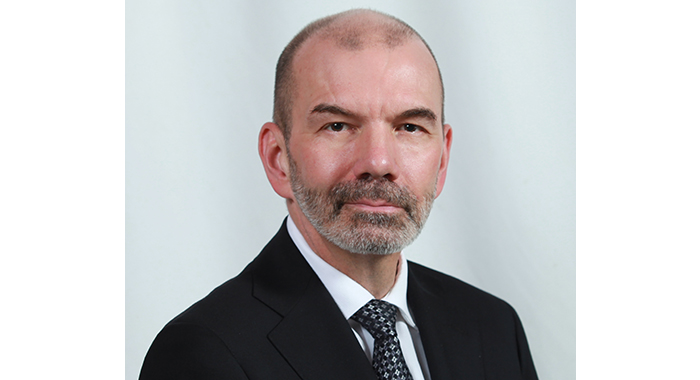
The judge said that Jackson’s behaviour in the holding cell at the Criminal Investigations Department (CID) in Kingstown during the hours before the interview confirmed auditory hallucinations.
“The threats to kill police constitute aggressive behaviour,” he further said, referring to what Providence identified as the five symptoms of psychosis.
“All of that occurred shortly before the electronic interview,” Justice Floyd said. “That is behaviour indicative of mental health issues. Indeed, within one to two days the applicant is medically confirmed as suffering from a psychosis.”
The judge, however, noted that the interrogators were unaware of Jackson’s behaviour in the holding cell before they conducted an electronic interview with him.
Justice Floyd said it was to the credit of detective Sergeant Kasankie Quow, the lead investigator, that he said that had he known about Jackson’s behaviour, he would not have conducted an interview as doing so would not have been proper.
“This pattern of behaviour continued to be exhibited at the hospital by [Jackson] very soon after the interviews. The diagnosis of cannabis use psychosis based upon the extensive use of cannabis since a very young age must surely indicate that the condition had been present for some time,” the judge said of Jackson’s psychosis.
“There is no indication that it suddenly manifested itself in the holding area on Nov. 15, 2018,” the judge said, adding that Jackson must have been suffering from the condition at the time of the first interview.
“This court is satisfied that the applicant was suffering from a mental illness at the time of the electronic interview,” he said.
“Indeed, the court is satisfied that the applicant was suffering from a mental illness at the time of each of the three interviews conducted in this case. His observed behaviour in the holding cell area was confirmed upon his hospital admission. The diagnosis of psychosis even if it is described as mild is sufficient.”
‘disjointed and rather cavalier’ police attitude
Justice Floyd’s ruling brought to an end a chapter in Jackson’s life that included his consumption of poison while in police custody and no investigation conducted into how he obtained the toxin.
This was among the police failures that the judge highlighted about the investigation and described as “disjointed and rather cavalier’ the attitude with which the case and Jackson were treated by “persons in authority”.
He said that a review of the station diary at CID which contained information about Jackson’s behaviour the night before police interviewed him might have raised red flags for Quow ahead of the interview.
The judge further noted that none of Quow’s colleagues told him about Jackson’s abnormal behaviour in the hours before he was interviewed.
Shopkeeper murdered
Jackson’s interaction with the justice system began on Nov. 14, 2018, when two men, each armed with a gun, told him to “govern” a road in Hollywood, Redemption Sharpes while they went on a “mission”.
The men, who Jackson identified as “Gobler” and “Steppy”, went into an area, and shortly after, gunshots rang out.
The two armed men, who had covered their faces, fled the scene and it became clear shortly after that Sabitree Lyttle, a 56-year-old shopkeeper had been shot and killed.
Lyttle’s neighbours heard and saw parts of the incident but no one was able to identify the gunmen as their faces were recovered and they escaped.
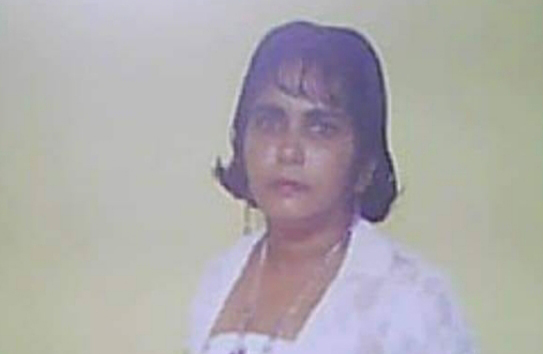
Jackson, however, was seen in the vicinity and asked another shopkeeper for some water.
Police responded to the shooting and arrested Jackson later that same day and turned him over to Quow.
Meanwhile, Sergeant Julians Morgan was the leader of a team of officers who were responsible for transporting Jackson to the police station.
Morgan told Quow that Jackson had said that he wanted to speak to the police about what had happened.
Quow spoke to Jackson in the presence of now Superintendent of Police, detective Hesran Ballantyne, who was then the officer in charge of CID.
Quow made written notes, but those notes did not confirm that Jackson had been cautioned.
Jackson was placed in a holding cell at CID that night and the following day, Quow and detective acting Corporal of Police Edmund Ollivierre, then a constable, interviewed him, having administered the caution and informed him of his right to a lawyer.
Suspect consumes poison while in police custody
During that interview, Jackson identified Gobler and Steppy as the men who had approached him that day as he was walking.
He further said that each of the men had a pistol and told him to “govern” the area, meaning act as a lookout, as they went on a “mission”.
In the interview, Jackson said it was unclear to him what the two men intended to do. However, he later heard some shots and saw Gobler and Steppy running away.
Jackson described in the audio-visual interview the clothing that Gobler and Steppy were wearing and his description matched that which other witnesses gave to police.
On Nov. 16, the police took Jackson to the scene of the crime and pointed out certain locations. The police took notes, which included a caution, and asked Jackson to sign them.
However, later that same day, Jackson had to be rushed to hospital, having consumed a toxic substance, later identified as the weedicide Touchdown.
Jackson remained in hospital for four days until Nov. 20, 2018, when he was discharged back into the custody of the police.
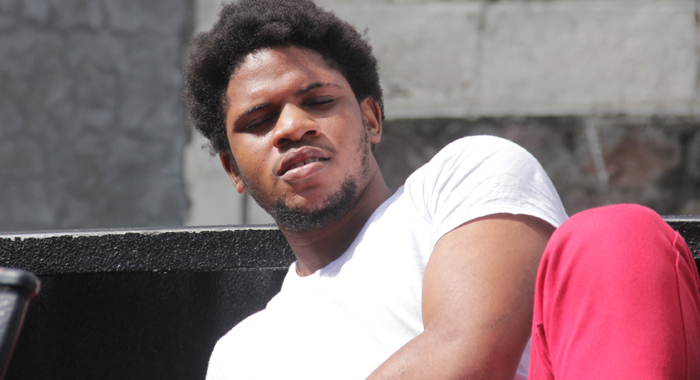
Gobler and Steppy murdered
Jackson was charged with murder in connection with Lyttle’s death. However, Gobler and Steppy, whose real names were Jerroy Phillips and Lionel George were never charged.
Both of them were shot and killed — each in a double homicide — within four years of Lyttle’s death.
Geroge, 28, of Rockies, was gunned down in Arnos Vale on May 22, 2020, alongside his girlfriend, Denesia “Gazaden” Corridon, 23, of Yambou.
Corridon had also been present and had helped George when a gunman shot him five times in Middle Street, Kingstown as they were unpacking clothes for sale on Nov. 5, 2019.
Phillips aka “Jay Jay”, 27, died in a hail of bullets in Redemption Sharpes on Nov. 5, 2022, that also claimed the life of Lorenzo “Scene” DeShong, 30, and left three others injured.
No one was charged in connection with the double homicides.

Jackson’s mental health of ‘greater significance’
In the voir dire, last week Bacchus-Baptiste argued that Jackson was suffering from a mental illness at the time of the interview and had been subjected to physical violence by the police before giving his first statement.
She further submitted that Jackson did not have an operating mind at the time such that he could comprehend his situation and the jeopardy that he was faced with.
Jackson was physically and mentally ill, she argued, saying that the mental illness was confirmed in Providence’s medical evidence and the hospital file.
After examining the evidence in the voir dire, the court was unable to come to find, conclusively, that Jackson had been physically abused by police.
“What is of greater significance, however, is the state of the applicant’s mental health throughout this period of custody and his interactions with the police,” Justice Floyd said.
He said all of the police witnesses who had contact with Jackson and testified in the voir dire, said he appeared normal and not in distress.
“… evidence tendered contradicts that,” the judge said, noting in particular the CID station diary that contains entries relating to Jackson’s detention.
The judge noted that Jackson was brought into police custody around 5 p.m. on Nov. 14, 2018.
By 3:30 a.m. the following day, an entry was made in the station diary that when the holding area was checked, Jackson was sitting on the bench talking to himself.
A 4 a.m. entry said that Jackson was standing and talking to himself.
Police checked again at 4:16 a.m., and heard Jackson say that when released, he was going to kill a police officer or an officer’s family member. He said he would make a telephone call and have them killed.
When checked at 4:30 a.m., Jackson was asleep.
The judge further noted that the electronic interview began at 9:47 a.m. that day — Nov. 15, 2018.

Justice Floyd said the evidence clearly indicates that Jackson was displaying unusual behaviour immediately before his electronic interview, and not long after his first police interview.
“The behaviour is therefore contemporaneous to those interviews,” the judge said.
He noted that at 4:30 p.m. on Nov. 15, 2018, Jackson was back in the holding area.
When he was checked, he was seen pulling pieces of steel from the ceiling, saying that he was going to use them to hit the police.
Justice Floyd noted that Quow confirmed in his evidence that one would need to stand on a table to reach the ceiling in the holding area.
“Again, this is highly unusual behaviour displayed by the applicant contemporaneous to the statements provided,” the judge said.
He further pointed out that on cross examination, Quow confirmed that before the electronically recorded interview he conducted with Jackson, he was not aware of any of those station diary entries.
The detective also told the court that he was not aware of any of the behaviour exhibited by Jackson before the interview.
“He said that none of that information was brought to his attention. He agreed that it was strange behaviour.”
Justice Floyd noted that when asked what he would have done had he known that behaviour, Quow responded that he would have reported it to the supervising officer and sought guidance.
‘Troubling’ that investigator ‘unaware of such important and relevant behaviour’
The judge further recounted that Ollivierre said that he, too, was also unaware of such behaviour exhibited by Jackson before the interview.
“It is troubling that the investigating officer in this case, Sergeant Quow, a police officer of 28 years’ experience — somewhat less at the time of the interview, but substantial nonetheless –was unaware of such important and relevant behaviour on the part of his main suspect, who he had just interviewed and who was about to be interviewed properly and electronically,” the judge said.
“A suspect in a murder investigation detained in the holding area of the main police station in St. Vincent seems to be talking to himself and threatening to kill police officers and no one does anything about it nor reports it to the officer in charge of the case. Nor does the investigating officer make it his business to check on the cell records before interviewing his prime suspect.”
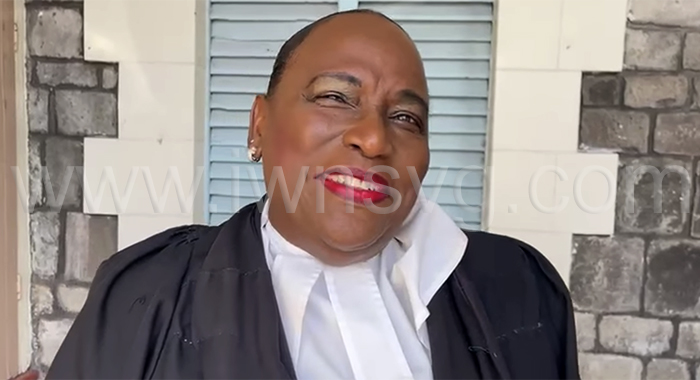
The judge said that such behaviour by the police is “concerning”.
“It indicates a general lack of care and due diligence on the part of the police. Not only are safety concerns and issues raised for police but the health and safety of the detainee is engaged.
“It calls into question the state of mind of the applicant and demands an investigation before the interview. Unfortunately, that did not happen. In a murder investigation being conducted by experienced police officers, one would expect more.”
The judge said that the concerns about Jackson’s state of mind are later borne out when his behaviour escalates to standing on furniture to get at the ceiling and obtain a weapon with which to either harm himself or the police.
“Then, of course, the applicant ultimately ingests a toxic substance and is finally rushed to the hospital for treatment.
“The lack of interest and engagement on the part of the police is confirmed when the investigating officer admits during the voir dire that no investigation into how the applicant obtained poison while in custody at the main police station was ever to his knowledge carried out.”
‘surprising and disturbing’ chain of events continues
The judge said that the “surprising and disturbing” chain of events continues when it becomes apparent that the discharge summary that was given to the police following Jackson’s hospitalisation was attached to the case file by the investigating officer but did not form part of the disclosure package given to defence counsel.
It is unknown how the document became detached from the file and no aspersions can be cast at any department in particular, Justice Floyd said.
He said that when requested by the defence, the prosecution obtained and produced medical records, station diaries and other material.
“However, it is another example of the disjointed and rather cavalier attitude with which the case and in particular, the applicant was treated by persons in authority.”
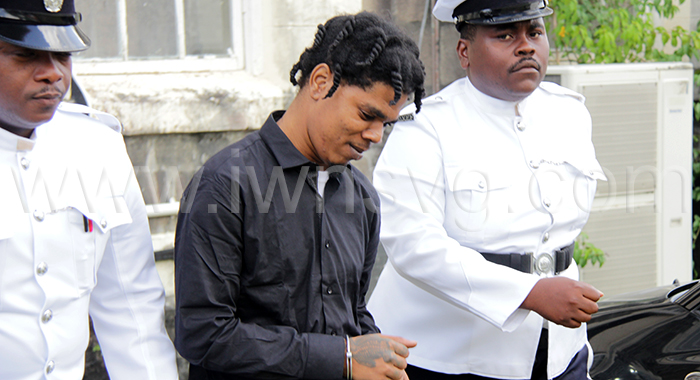
The judge noted that Jackson was admitted to hospital on Nov. 16, 2018, after ingesting a foreign substance while in police custody.
Jackson told medical staff that he had swallowed a pesticide to take his own life because he did not want to go to court or to jail.
The staff determined that Jackson had consumed the herbicide Touchdown
Further, there were indications of auditory hallucinations in that Jackson was hearing voices and he was referred to the psychiatric team.
Providence prepared a report on Nov. 17, 2018, indicating that the applicant reported hearing voices every day.
He further said that he had had suicidal thoughts since he was a teenager and did not want to go to court.
Providence said that Jackson had ingested a toxic substance. He had a dysphoric mood (a mental state in which a person has a profound sense of unease or dissatisfaction) and blunted affect (a decreased ability to express emotion through facial expressions, tone of voice, and physical movements).
The doctor said there was a need to rule out major depressive disorder and cannabis use disorder with psychosis was noted.
Jackson was to start anti-psychotic medication.
Providence described Jackson as “labile” (unstable) “with poor judgment and insight”.
The judge noted that an entry was made in Jackson’s patient’s notes on Nov. 18, 2018, at 3 p.m. that he was having auditory hallucinations, talking to himself aloud — the same behaviour as previously noted in the police station diary while he was detained.
Jackson was discharged from the hospital on Nov. 28, 2018, with a final diagnosis of ingestion of a toxic substance, a need to rule out major depressive disorder and cannabis-use-induced psychosis.
He had been assessed by the psychiatric team for four days, and given the direction through the psychiatric department at the Mental Health Rehabilitation Centre.
The judge said it is unknown, although highly unlikely whether any such follow-up ever occurred as Jackson remained in custody.




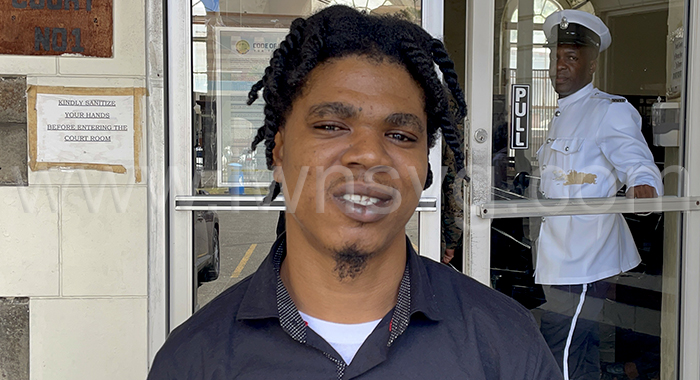


Who told the police not to read arrested person’s their rights? Was it a prominent politician?
Only in SVG
This man is clearly psychotic. Proper diagnosis should have been done before he was locked up and the keys thrown away.